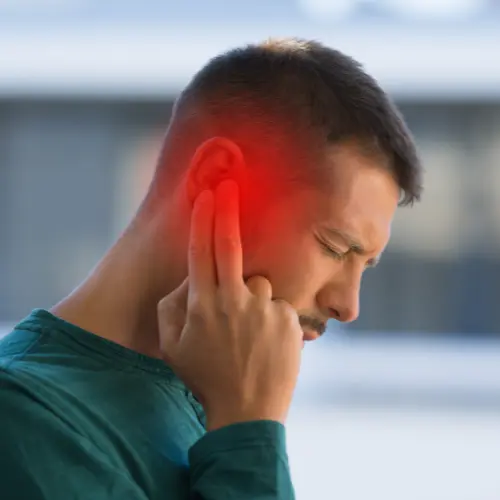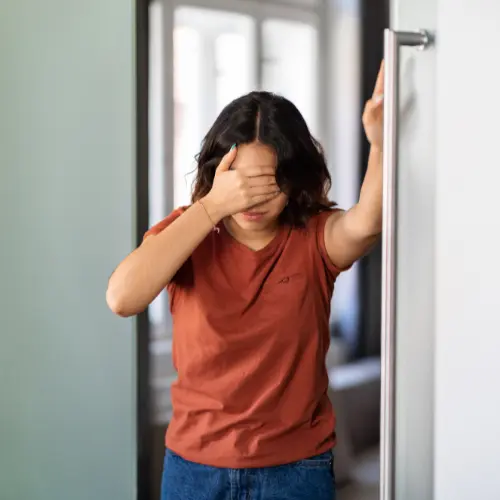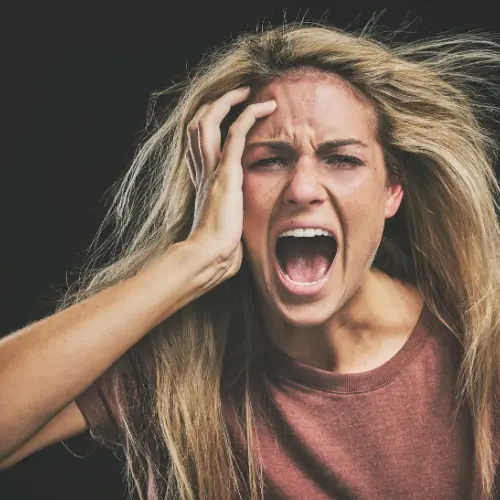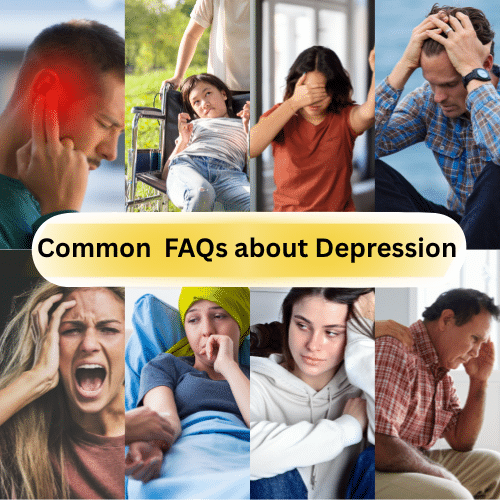Depression is more than feeling unhappy. It can disturb your body and mind equally in lots of ways. Depressed people may feel exhausted, faint or even have attacks. It can also make it tough to think clearly and recall things or make decisions. Long-term stress, sleep complications and changes in the brain caused by depression can make these problems poorer.
In this FAQ, we answer common problems about how depression can disturb health, clarify possible threats and show the symbols that mean it’s essential to get help in a timely manner.
1: Can Depression Cause Tinnitus?
Tinnitus is when you hear ringing, buzzing or other sounds in your ears that aren’t coming from outside. It typically happens because of hearing complications, ear infections or brain problems. But depression can make tinnitus worse. When somebody is depressed, stress and anxiety frequently go up which can make these sounds feel louder. Depression can also cause poor sleep, low energy and trouble handling everyday life which can make tinnitus clearer.
While depression doesn’t openly cause tinnitus, it can create a cycle where tinnitus makes you feel poorer and feeling worse makes tinnitus look stronger.
Stress Levels go Up: Depression can increase anxiety, making your brain more sensitive to sounds, with tinnitus.
Anxiety Gets Stronger: Feeling nervous because of depression can create even minor ringing or buzzing that feels very disturbing.
Trouble Sleeping: Depression frequently causes bad sleep, which can cause your brain to notice internal sounds more.
Harder to Cope: When depressed, it’s tougher to switch between continuous noises which can increase frustration and concern.
More Sensitive to Sounds: Depression can make your senses more alert so your brain may center more on the ringing or buzzing.
Treating depression with therapy, healthy habits and medication if required which can help decrease how much tinnitus worries you and improve your whole life.

For more detailed information on Can Depression Cause Tinnitus?, check out our full guide.
2. Can Depression Cause Seizures?
Seizures happen basically when the brain has unexpected and uncommon electrical activity. They are typically caused by epilepsy, brain damage, infections or genes. But depression can disturb some things that make seizures more likely. Long-term or strong depression can change brain chemicals which increase anxiety and cause poor sleep. These changes can make the brain more sensitive.
Medicine and Health Conditions
Some depression medicines particularly in high doses, can rarely increase the risk of seizures. This does not mean depression causes seizures. People who have previously had epilepsy or other brain complications want careful monitoring. When depression worsens, existing brain complications can also worsen and seizures may happen more frequently or be stronger. Knowing this helps doctors take care of both depression and brain health securely.
Lowering the Risk with Therapy and Healthy Habits
Seizures want their separate medical treatment but treating depression can help protect brain. Speaking to a counselor or doing therapy like CBT can decrease stress. Getting enough sleep, managing anxiety, exercising securely and taking medicines, as the doctor says all aid the brain in staying healthy. Treating depression well can strengthen the brain and decrease things that may trigger seizures.
Depression does not cause seizures by itself. But it can disturb the brain in ways that may increase the possibility of seizures, so taking care of both mental health and brain health is essential.

3: Can Depression Cause Dizziness?
Feeling dizzy, lightheaded or unsteady is common in people with depression. Depression does not openly harm the brain or ears that control balance but it can disturb the body in ways that make you feel off-balance. One reason is that depression can get in the way of the autonomic nervous system which controls things like blood pressure, heart rate, and circulation. This can sometimes cause dizziness, fainting or vertigo.
Other reasons include being very exhausted, not sleeping well or feeling anxious which frequently happen with depression. Feeling drained can make simple movements feel tougher. Some depression medications may also cause dizziness as a side effect. People with depression may also eat poorly, drink less water or exercise less which can worsen dizziness. Stress and high hormone levels in the body can disturb circulation and the brain, creating unsteadiness and stronger symptoms.
Dizziness can have lots of causes but depression can make it feel worse. Treating depression with therapy, the correct medicines, anxiety management and healthy habits can frequently help decrease dizziness. Getting enough sleep, drinking water, eating well and doing regular exercise can also help. Understanding to how depression and dizziness are associated can help people feel well and manage their symptoms more effortlessly.

4: Can Depression Cause Anemia?
Depression does not directly cause anemia but it can make it more likely. People with depression frequently lose their appetite or eat less healthy food and this can lead to a lack of key nutrients like iron, vitamin B12 and folate which are required to create healthy red blood cells. Without enough of these nutrients, body may develop anemia. Long-term depression can also increase anxiety in the body. Stress hormones can disturb how the body uses iron and creates red blood cells. Feeling very exhausted and low in energy or ignoring self-care during depression can make it worse.
Generally, getting assistance from a doctor and taking care of your diet is key. Treating depression and eating nutrient-rich foods can equally help stop or improve anemia.
Key points:
Depression can decrease appetite and cause poor eating habits, leading to a reduced intake of iron, B12 and folate.
- Long-term anxiety from depression can disturb red blood cell production.
- Severe or continuing depression increases possibility of anemia.
- Treating depression and eating a healthy diet together can help recover whole health.
After taking care of mental health and eating well, it’s possible to keep up healthy blood and feel well.

5: Can Depression Cause Schizophrenia?
Depression and schizophrenia are diverse mental health complications. Depression does not directly cause schizophrenia. However, severe or untreated depression can lead to signs like seeing or trusting things that are not real known as psychotic symptoms. Equally, illnesses share some brain and genetic traits. Timely treatment of depression can lower the possibility of psychotic symptoms. Schizophrenia typically happens on its own due to various factors. Getting help on time and having support are essential to managing symptoms.
Psychotic Depression
Sometimes very bad or long-lasting depression can cause hallucinations or wrong beliefs. This is known as psychotic depression. It is changed from schizophrenia but can look alike. Finding it timely helps doctors offer the correct treatment and helps people get better sooner.
Shared Vulnerabilities
Depression and schizophrenia have some parallel brain and genetic factors. These can make a person more likely to have symptoms that overlap. But having depression does not mean somebody will get schizophrenia. Brain chemistry and genes disturb together conditions.
Independent Development
Schizophrenia typically develops independently of depression. It happens due to a mixture of genes, environment and brain changes. Depression occurs primarily but it does not cause schizophrenia. Knowing this helps decrease fear and confirms correct treatment.
Importance of Early Treatment
Treating depression timely is very important. Therapy, medicines and support can improve mood which help the brain work well and stop complications. Early care also helps overall mental health and lowers the chance of more severe problems later.

6: Can Depression Cause Cancer?
Depression does not directly cause cancer. But, long-lasting depression can disturb a person’s habits and body in ways that might increase health risks. Understanding it can help to people take steps to stay healthier.
Impact on Lifestyle Habits
People with depression have trouble maintaining healthy habits. They may smoke, drink too much alcohol, eat poorly or avoid workouts and increase the danger of cancers like lung, liver and colon cancer. Treating depression can help people make healthier selections which may lower these threats.
Chronic Stress and Inflammation
Depression frequently comes with continuing stress. Stress can cause inflammation in the body which can gradually damage cells and tissues. This may make it tougher for the body to fix damaged DNA and increasing the chance of cells turning cancerous. Managing anxiety through therapy, meditation or a workout can aid in protecting the body.
Hormonal and Immune System Changes
Depression can change hormone levels, like cortisol and weaken the immune system. A weaker immune system may not catch and destroy abnormal cells as well, giving them a chance to grow into cancer. Looking after mental health can help the body’s natural defenses work well.
Importance of Early Intervention
Treating depression in a timely manner improves mental health and may lower indirect health dangers. Therapy, medications, lifestyle changes and support from friends or family can all aid in decreasing long-term complications.
Promoting Holistic Health
Taking care of depression is part of remaining healthy and whole. Eating well, exercising, reducing dangerous behaviors and managing anxiety all support the body. While depression doesn’t cause cancer, managing it can help people stay stronger and healthier and reduce the risk of severe diseases over time.

7: Can Depression Cause Iron Deficiency?
Iron deficiency typically happens when we don’t eat sufficient iron, lose blood or our body can’t absorb iron well. Depression does not directly cause low iron but it can make it more likely. People with depression may misplace their appetite, skip meals or avoid healthy foods which takes down the iron they get from their diet. Feeling very exhausted and low on energy can make cooking or eating properly harder which also decreases iron intake. Sometimes, depression can cause inflammation in the body, making it tougher for iron to be absorbed. Certain medicines for depression may cause nausea or prevent you from feeling hungry, further decreasing iron intake.
Over time these problems can lead to iron deficiency which can cause fatigue, weakness, pale skin, dizziness and trouble concentrating. Taking care of depression and eating iron-rich foods can help stop iron deficiency and keep your body and mind healthy. Getting must support from a doctor or counselor and planning nutritious meals can create a great change.
Key Points:
- Depression can cause to lose appetite and reduce iron intake.
- Missing meals or avoiding healthy foods increases the risk of low iron.
- Inflammation from depression can make it tough for body to use iron.
- Medicines and tiredness may reduce the amount of iron in your diet.
- Treating depression and eating well can stop iron deficiency and its signs.

8: Can Depression Cause Dementia?
Depressed people may notice their memory and thinking skills drop sooner than those who have not had depression. Depression does not openly cause dementia but having long-term depression, particularly later in life can increase the chance of memory and thinking complications.
Effects on Memory and Focus: Depression can make it tougher to recall things, focus or plan ahead. These complications can look like the early symptoms of dementia which can make it difficult to tell the change between depression-related memory problems and real dementia.
Changes in the Brain: Long-term depression can disturb to brain’s structure and function. Areas of the brain that support learning, memory and controlling emotions like the hippocampus and prefrontal cortex may shrink or work less well if depression is not treated.
Importance of Early Treatment: Must getting assistance for depression timely through therapy, medicine or healthy habits which can protect the brain. Treating depression can lower the risk of memory complications and keep the brain sharper for longer.
Healthy Lifestyle Helps: Eating well, remaining physically active, spending time with others and doing activities which challenge to mind can support to brain health. These habits help decrease the negative effects of depression and improve long-term thinking skills.
Simply, depression does not lead to dementia. The people can decrease the risk of memory complications and have their mind healthier as they age by treating depression timely and taking care of their mental and physical health equally.

Conclusion:
In short, the depression can sometimes create complications like ringing in the ears, dizziness or even seizures. Still, it typically does not directly cause them. Depression changes to brain chemicals, increases anxiety and can disturb sleep which can make the body more sensitive to these symptoms. Feeling very nervous or worried due to depression can create tinnitus or dizziness worse. Seizures typically come from other brain conditions but severe depression can increase the risk by disturbing brain health.
Basically, getting assistance through therapy, medicine, healthy habits and stress control can decrease these symptoms and improve your’s life. Spotting the depression and then getting professional help is all right.


Recent Comments